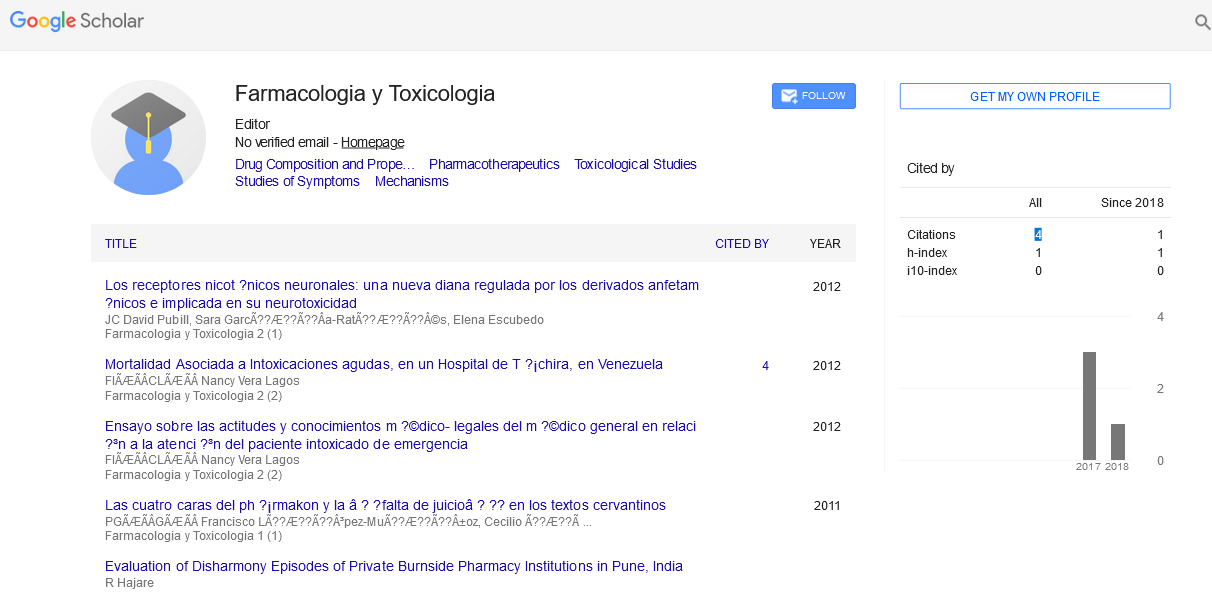Perspective - (2024) Volume 14, Issue 3
The Dynamic Landscape of Pharmacology: Unveiling the Science behind Drug Action
Gijs A. Kleter*
Department of Pharmacology, University of Trijie, Amsterdam, Netherlands
*Correspondence:
Gijs A. Kleter, Department of Pharmacology, University of Trijie, Amsterdam,
Netherlands,
Email:
Received: 04-May-2024, Manuscript No. IPFT-24-14770;
Editor assigned: 08-May-2024, Pre QC No. IPFT-24-14770 (PQ);
Reviewed: 22-May-2024, QC No. IPFT-24-14770;
Revised: 04-Jun-2024, Manuscript No. IPFT-24-14770 (R);
Published:
14-Jun-2024
Introduction
Pharmacology, often described as the backbone of medicine,
is a multidisciplinary field that investigates the effects of
substances on living organisms. With a rich history dating back
centuries, pharmacology has evolved from crude herbal
remedies to sophisticated molecular drugs, revolutionizing
healthcare practices worldwide. From ancient herbal remedies
to cutting-edge biotechnology, the field has evolved significantly,
revolutionizing healthcare practices worldwide. This article
delves into the intricate world of pharmacology, unraveling its
principles, methods and significance in modern medicine.
Description
Key concepts and principles
Several fundamental concepts underpin the field of
pharmacology, guiding drug discovery, development and clinical
application. Drug selectivity, for instance, refers to a drug's
ability to target specific receptors or pathways, minimizing offtarget
effects and enhancing therapeutic efficacy. The doseresponse
relationship elucidates the correlation between drug
dosage and its physiological effects, crucial for optimizing
treatment regimens and minimizing adverse reactions.
Additionally, pharmacogenetics explores the influence of genetic
variability on drug metabolism and response, heralding the era
of personalized medicine tailored to individual genetic profiles.
Understanding pharmacology
At its core, pharmacology examines how drugs interact with
biological systems to produce therapeutic effects or adverse
reactions. It encompasses various branches, including
pharmacokinetics (study of drug absorption, distribution,
metabolism and excretion), pharmacodynamics (study of drug
actions and mechanisms) and toxicology (study of harmful
effects of drugs). By elucidating these aspects, pharmacologists
optimize drug efficacy and safety, ultimately improving patient
outcomes.
Drug discovery and development
The journey from drug discovery to market approval is
arduous and entails rigorous research, testing and regulatory
approval processes. It typically begins with target identification,
where researchers identify specific molecules or pathways
involved in a disease process. Subsequently, candidate
compounds undergo preclinical studies involving in vitro and
animal experiments to assess safety and efficacy. Promising
candidates advance to clinical trials, where they are tested in
humans to evaluate safety, dosage and effectiveness. Regulatory
agencies, such as the FDA in the United States, meticulously
review trial data before granting approval for drug marketing.
Pharmacogenomics
Advancements in genetics have revolutionized pharmacology
through pharmacogenomics, the study of how genetic variations
influence drug response. Variations in genes encoding drugmetabolizing
enzymes, drug transporters or drug targets can
impact individual responses to medications. Pharmacogenomic
testing enables personalized medicine by guiding drug selection
and dosing based on an individual's genetic makeup, minimizing
adverse effects and optimizing therapeutic outcomes.
Precision medicine
The concept of precision medicine, rooted in
pharmacogenomics, emphasizes tailoring medical treatment to
the individual characteristics of each patient. By integrating
genetic, environmental and lifestyle factors, healthcare providers
can make informed decisions about drug therapy, leading
to more effective and safer treatments. Precision medicine has
shown promising results in various fields, including oncology,
cardiology and psychiatry, offering hope for improved patient
care and outcomes.
Pharmacovigilance
Ensuring drug safety is paramount in pharmacology and
pharmacovigilance plays a pivotal role in monitoring and
assessing Adverse Drug Reactions (ADRs). Healthcare professionals and regulatory agencies collaborate to collect, analyze and
respond to ADR reports, enhancing drug safety profiles and
minimizing risks to patients. Pharmacovigilance contributes to
post-marketing surveillance, enabling the identification of rare or
long-term adverse effects that may not have been evident during
clinical trials.
Drug delivery systems
In addition to drug discovery and development,
pharmacologists innovate drug delivery systems to enhance
therapeutic efficacy, patient compliance and convenience. Novel
drug delivery technologies, such as nanoparticles, liposomes and
transdermal patches, enable targeted drug delivery, sustained
release and improved bioavailability. These advancements
optimize drug distribution, minimize side effects and facilitate
the administration of complex drug regimens, benefiting patients
with various medical conditions.
Herbal medicine and traditional pharmacology
While modern pharmacology predominantly focuses on
synthetic drugs, herbal medicine and traditional pharmacology
continue to play significant roles, particularly in non-Western
cultures. Herbal remedies derived from plants have been used
for centuries to treat various ailments and their therapeutic
potential is increasingly recognized in mainstream medicine.
Pharmacologists study the pharmacokinetics, pharmacodynamics
and safety profiles of herbal products to integrate them into
evidence-based healthcare practices.
Therapeutic modalities and clinical applications
Pharmacology encompasses a diverse array of therapeutic
modalities, ranging from small-molecule drugs to biologics and
gene therapies. Antibiotics combat bacterial infections by
inhibiting essential cellular processes or disrupting bacterial cell
walls, exemplifying the profound impact of pharmacology
on public health.
Anticancer agents target malignant cells through various
mechanisms, including DNA damage, cell cycle arrest and
immune modulation, offering hope for patients battling
cancer. Furthermore, psychotropic drugs alleviate psychiatric
disorders by modulating neurotransmitter levels in the brain,
underscoring the role of pharmacology in mental health care.
Challenges and future directions
Despite its numerous achievements, pharmacology faces
various challenges and complexities in the modern era. Drug
resistance poses a formidable threat, compromising the efficacy
of antibiotics, antivirals and anticancer drugs, necessitating the
development of novel therapeutic strategies. Moreover,
ensuring drug safety remains a paramount concern, with
adverse drug reactions accounting for significant morbidity and
mortality worldwide. Addressing these challenges requires
interdisciplinary collaboration, innovative research
methodologies and a commitment to translational medicine
bridging the gap between benchside discoveries and bedside
applications.
Conclusion
Pharmacology remains a cornerstone of modern medicine,
driving innovation, improving patient care and shaping
healthcare policies worldwide. From drug discovery and
development to personalized medicine and drug delivery
systems, pharmacology continues to evolve, offering solutions to
complex medical challenges. As we navigate the dynamic
landscape of pharmacology, interdisciplinary collaboration and
scientific advancements will pave the way for safer, more
effective therapies, ushering in a new era of healthcare
excellence.
Citation: Kleter GA (2024) The Dynamic Landscape of Pharmacology: Unveiling the Science behind Drug Action. Farmacologia Toxicologia Vol.14
No.3: 027





